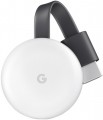Ultra HD 4K support
The ability to play video in
ultraHD 4K on the device. This format covers several resolutions, all of which have a horizontal size of approximately 4000 pixels. However, the most popular is the frame size of 3840x2160 — in particular, this is the standard value for 4K TV screens; therefore, most UltraHD content is also released in this resolution.
A 3840x2160 frame contains 4 times more pixels than the popular Full HD standard, resulting in an even sharper and more detailed image. Of course, you will need a TV (or other screen) of the appropriate resolution to fully enjoy the experience; but such screens nowadays are becoming more common and affordable.
HDR support
HDR standard supported by the media player.
For more details about HDR in general, see above, while the standard defines some features of the implementation of this feature. Today, the following HDR formats are relevant:
— HDR10. Historically the first of the consumer HDR formats, less advanced than the options described below, but extremely widespread. In particular, HDR10 is supported by almost all streaming services that provide HDR content at all, and it is also common for Blu-ray discs. Allows to work with a colour depth of 10 bits (hence the name). At the same time, devices of this format are also compatible with content in HDR10 +, although its quality will be limited by the capabilities of the original HDR10.
— HDR10+. An improved version of HDR10. With the same colour depth (10 bits), it uses the so-called dynamic metadata, which allows transmitting information about the colour depth not only for groups of several frames, but also for individual frames. This results in an additional improvement in colour reproduction.
—
Dolby Vision. An advanced standard used particularly in professional cinematography. Allows to achieve a colour depth of 12 bits, uses the dynamic metadata described above, and also makes it possible to transmit two image options at once in one video stream — HDR and standard (SDR). At the same time, Dolby Vision is based on the same tec
...hnology as HDR10, so in modern video technology this format is usually combined with HDR10 or HDR10 +. Remote control
Remote control included with media center or TV tuner. In addition to the classic remote control with basic controls, there are manipulators with additional features.
— QWERTY keyboard. Such remotes, in addition to the standard set of keys for controlling the player (see above), have an alphabetic keyboard similar to a computer one. This is relevant primarily for media centers with support for social media and photo services — a keyboard with letters is needed at least to enter a login/password.
— With sensors. A kind of remote control that uses sensors instead of classic buttons. Such equipment is somewhat more expensive, on the other hand, the sensors give the remote control a stylish appearance, and in some cases they are more convenient than buttons.
—
With voice control. A remote control equipped with a built-in microphone and capable of recognizing a specific set of voice commands. This control format is often more convenient than using buttons/sensors. At the same time, the set of supported commands can be different — sometimes it is quite limited compared to traditional remotes, sometimes vice versa (for example, it may be possible to type text using voice input); these nuances should be clarified separately. It also will be useful to find out the list of supported languages; note that English is almost guaranteed to be on this list, but Russian not always.
- Programmable. A universal rem
...ote control that can be configured to work in conjunction with media players, TV tuners and other home electronics. By default, such remote controls are loaded with a database of signal codes for various types of equipment. To activate a specific device, they usually use a certain combination of button presses. Often programmable remote controls have teachable keys, a built-in gyroscope, an air mouse function and other similar options. The programmable buttons on these models are often dedicated to controlling the TV, eliminating the need for multiple remote controls. The service manual for them contains detailed programming instructions from the manufacturer.
— Programmable with voice control. An advanced type of programmable remote controls (see the corresponding paragraph) with a built-in microphone for issuing voice commands. Voice control is fully supported on set-top boxes running Android; together with conventional media players and TV tuners, you can make voice requests by speaking a phrase into the remote control. The exact implementation of voice control varies depending on the remote control model and the receiving device.
— Absent. The absence of a remote control is typical for network media players controlled from other devices — usually from a computer or from a mobile gadget through a special application.
